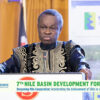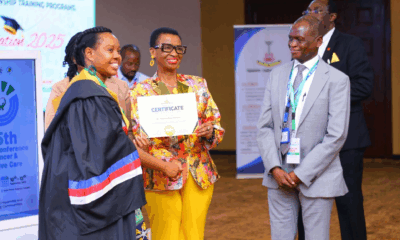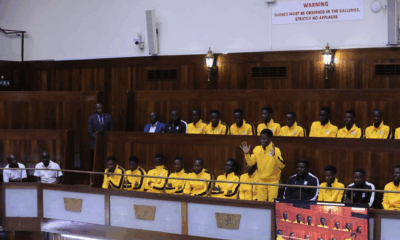News
Nile Basin Heads of State to meet more regularly

The Newly elected NileCom Chair and Burundi’s Water Minister Dr. Rurema (middle) while announcing the developments during a press conference in Bujumbura
Bujumbura, Burundi: The 26th Nile Council of Ministers has agreed to institutionalise and regularise the Nile Basin Heads of State Summit. Burundi’s Minister of Environment, Agriculture and Livestock, Dr. Deo-Guide Rurema, who is also the chairman of the Nile Council of Ministers, has said.
This means that the Heads of State Summit will likely replace the Nile Council of Ministers (NileCom) as the highest Decision-making organ of the regional body. The move follows the first Heads of State Summit that took place in July 2017 in Uganda. The meeting is said to have played a major role in getting Egypt back into the discussions on the use of the Nile water resources.
Dr. Rurema was speaking at a press conference to mark the end of the 26th Nile Council of Ministers meeting in Bujumbura, Burundi.
“The Heads of State Summit is a platform that the Nile Basin Initiative will utilise to promote the Nile Basin development,” he said.
The Nile Council of Ministers is an annual gathering of the Ministers of Water Affairs from each of the Member States of the Nile Basin Initiative. The meeting was attended by ministers from Burundi, Ethiopia, South Sudan and Uganda while DR Congo, Egypt, Sudan and Tanzania were represented by high level government officials. Kenya and Rwanda did not participate.
During the meeting, the Republic of Burundi assumed political leadership of the Nile Basin Initiative, succeeding the Federal Democratic Republic of Ethiopia. The changes in leadership are in keeping with the NBI tradition of annually rotating the position of both chairman of the Nile Council of Ministers and the Nile Technical Advisory Committee among Member States.
The Nile Council of Ministers offered strategic guidance and direction on key issues aimed at encouraging Member States to jointly address their common challenges including water scarcity, food and energy insecurity and climate change as well as institutional matters of the Nile Basin Initiative.
The ministers also discussed the financial sustainability of NBI.
“Member States agreed to meet their annual obligations in a timely manner so as to support NBI in meeting its core costs,” Dr Rurema said, adding, “Member States committed themselves to clear within the shortest possible time.”
The pronouncement of the commitment by Dr. Rurema must have come to the delight of the NBI secretariat since Burundi was until recently one of the countries that were indebted in as far as meeting their contributions in concerned.
In addition, the ministers approved the NBI Financing Strategy and the Resource Mobilisation Action Plan, both of which are to enable NBI raise more funds for core costs, programme work as well as implementation of regional investment projects.
The meeting was also attended by Members of the Nile Technical Advisory Committee, Management staff of NBI as well as representatives of development partners and civil society.
Comments


























